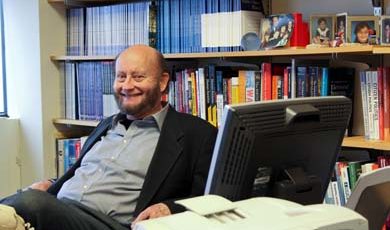Research News
-
Stem cell research at U-M: A five-year progress report
Five years ago this month, Michigan voters opened the door for a full range of stem cell research in the state. Today, that effort is well under way at U-M, and yielding results that are expanding knowledge of a wide range of diseases.
-
Susan Murphy nets MacArthur Fellowship
This innovative professor is developing smart-phone apps and other technologies to personalize treatment for depression, addiction, cardiovascular disease, and more.
-
Inducing, augmenting labor may be associated with autism risk
Pregnant women whose labors are induced or augmented may have an increased risk of bearing children with autism, especially if the baby is male, according to a large, retrospective analysis by researchers at U-M and Duke Medicine.
-
"We may be able to watch dark energy turn on"
Video: U-M is involved in unprecedented sky survey that seeks to know why the expansion of the universe is accelerating. Discover how an international team of scientists is making a time lapse—of the last 8 billion years.
-
Gunning for trouble
They’re young. They’ve been injured in an assault. They’ve landed in the ER. And nearly one in four of them has a gun. What happens next?
-
Would you accept an organ donated by a criminal?
Some people feel so “creeped out” that they would decline an organ—even a blood transfusion—if they knew it came from a murderer or thief, according to a new U-M study.
-
U-M researchers to study use of medical marijuana
A team of Medical School researchers recently received a four-year federal grant to study the impacts of marijuana on conditions related to cancer, glaucoma, pain.
-
To retire or not to retire?
Once upon a time, baby boomers were typecast as feckless do-nothings who cared only for sex, drugs, and rock ‘n’ roll. Lately, however, people born between 1946 and 1964 have taken on a new role: workaholic. According to a new U-M study, boomers now hitting retirement age are hanging onto their jobs like never before. In fact, some are forgetting to retire altogether.
-
Doctors save baby's life using 3D print technology
Video: U-M doctors made history recently when they used computer modeling and laser technology to design, fabricate, and implant a customized tracheal splint into a gravely ill infant. The groundbreaking procedure required emergency clearance from the Food and Drug Administration.









